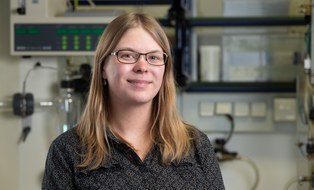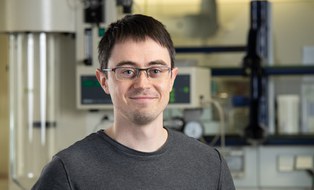Resource-saving and consumer-safe cleaning of pipelines with flexible, contour-adaptive suspension pigs made from basic food stuffs
Machines and systems in food production have to be cleaned after each product change. A special challenge is the cleaning of pipes filled with fat-based systems such as chocolate mass. These can only be cleaned with oil-based rinsing masses or the subsequent product. In both cases, mixed phases arise, which are usually discarded or sold at low price. This causes high costs and contributes significantly to food losses.
In industrial applications, a "pig" is used as cleaning device, which separates the two sequential product phases in pipelines to minimize mixed phases. This makes it possible to remove any product from highly viscous liquids up to granules from pipelines with almost no residue. However, the use of pigs is usually associated with high investment costs, and process reliability is frequently questioned. Difficulties arise from the geometry of pipelines, which has to be specially designed for pigging and must not contain built-in components, deflections and changes in cross section. Furthermore, it must be possible to inject and remove the pig. Possible abrasion or splintering from the pigs, which are usually made of plastic, poses a food safety risk.
The aim of the "FlexPig" project is to develop contour-adaptive pigs consisting of an oil-based suspension. A high solids content of the suspension should enable the removal of the previous product without a mixing phase as well as the adaptation to complex pipe geometries. In addition, a suspension composed of food-based ingredients, especially those of the subsequent product, ensures food safety. Knowledge of the rheological and tribological properties of the pig suspension allows the pig charcteristics to be optimally matched to the product to be removed.
The result of the project will be industry-proven suspension pigs that enable contour-adaptive cleaning over long pipe lengths without mixing phases, thus contributing to resource-efficient food handling.
In cooperation with:
- Fraunhofer-Institut für Verfahrenstechnik und Verpackung IVV Dresden
Project period:
- 01.07.2022 - 31.12.2024
Supported by:
Project researchers and contact:

Dipl.-Ing. Christiane Drechsel
Process engineering: Cleaning
Send encrypted email via the SecureMail portal (for TUD external users only).

Dipl.-Ing. Dennis Schab
Process engineering: Cutting, Cleaning
Send encrypted email via the SecureMail portal (for TUD external users only).
 © Surber
© Surber
Research Assistant
NameDr.-Ing. Susann Zahn
Food Process Engineering, Food Design
Send encrypted email via the SecureMail portal (for TUD external users only).
